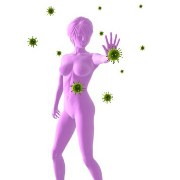 Photo: Getty Images
Photo: Getty Images
Our immune system does a phenomenal job of protecting us from various diseases and illnesses but on occasion we may be struck down with a cold. According to the National Institute of Allergy and Infectious Diseases (NIAID), ʺchildren have about two to six colds a year, while adults average about one to three colds a year.ʺ
Your immune system does a great deal of blocking and tackling different viruses during the fall and winter months. The NIAID’s website also revealed more than 200 different viruses can cause cold symptoms.
According to the National Center for Health Statistics (NCHS), the common cold is one of the leading causes of visits to the doctor and more than 62 million cases of the common cold occur annually.
The annoying symptoms of a drippy nose, cough, sneezing and irritated throat can last one to two weeks. Medical researchers and experts have not recognized 20-30 percent of the causes of the common cold. However, one of the best ways to prevent a cold is by enhancing or boosting your immune system.
There are several things you can do to enhance your immune system to protect yourself from cold and flu season. Here are some recommendations from the Harvard Medical School and The Center for Immune Research:
• Sleep. Not getting enough sleep can reduce the effectiveness of your immune system by up to 50 percent. Strive for seven to eight hours of sleep each night.
• Eat a diet high in fruits, vegetables, and whole grains, and low in saturated fat. According to a number of studies, not getting enough nutrients in the diet can weaken the immune system.
• Find Ways to Relax. Listen to music or take a hot bath to reduce stress and relieve anxiety. Scientists hypothesize that your immune system may become weakened after frequent activation of the autonomic nervous system in the case of chronic stresses.
• Consider an immune supporting supplement. Some supplements with these immune-boosting properties are pumpkin seed extract, plantago seed, safflower flower, and Japanese honeysuckle flower buds.
• Exercise regularly. Being physically active strengthens your immune system, cardiovascular system, heart, muscles and bones.
• Don’t Get Too Much Sun. Unprotected sun exposure is linked with immune suppression.
• Maintain a healthy weight. Research finds that a rapid weight loss of more than two pounds a week can have negative immune effects.
• Control your blood pressure.
• If you drink alcohol, drink only in moderation.
• Take steps to avoid infection, for instance, wash your hands frequently and cook meats thoroughly. Washing your hands several times per day and before you eat reduces your exposure to bacteria and viruses.
• Get regular medical screening tests for people in your age group and risk category
• Don’t smoke.
Sources:
Common Cold Cause . National Institute of Allergy and Infectious Diseases Home Page . Retrieved December 27, 2011, from http://www.niaid.nih.gov/topics/commonCold/Pages/cause.aspx
Common Cold Overview . National Institute of Allergy and Infectious Diseases Home Page . Retrieved December 27, 2011, from http://www.niaid.nih.gov/topics/commonCold/Pages/overview.aspx
How to boost your immune system : Harvard Health Publications. Health Information and Medical Information - Harvard Health Publications. Retrieved December 27, 2011, from
http://www.health.harvard.edu/flu-resource-center/how-to-boost-your-immune-system.htm
Welcome to ImmunityFacts.com. Welcome to ImmunityFacts.com. Retrieved December 27, 2011, from
http://www.immunityfacts.com
Reviewed December 27, 2011
by Michele Blacksberg RN
Edited by Jody Smith




Add a CommentComments
There are no comments yet. Be the first one and get the conversation started!